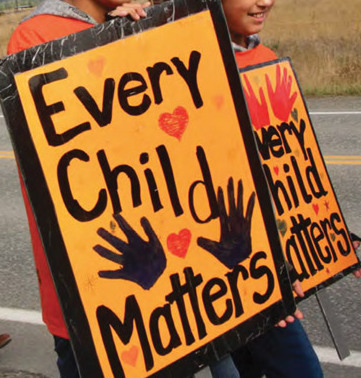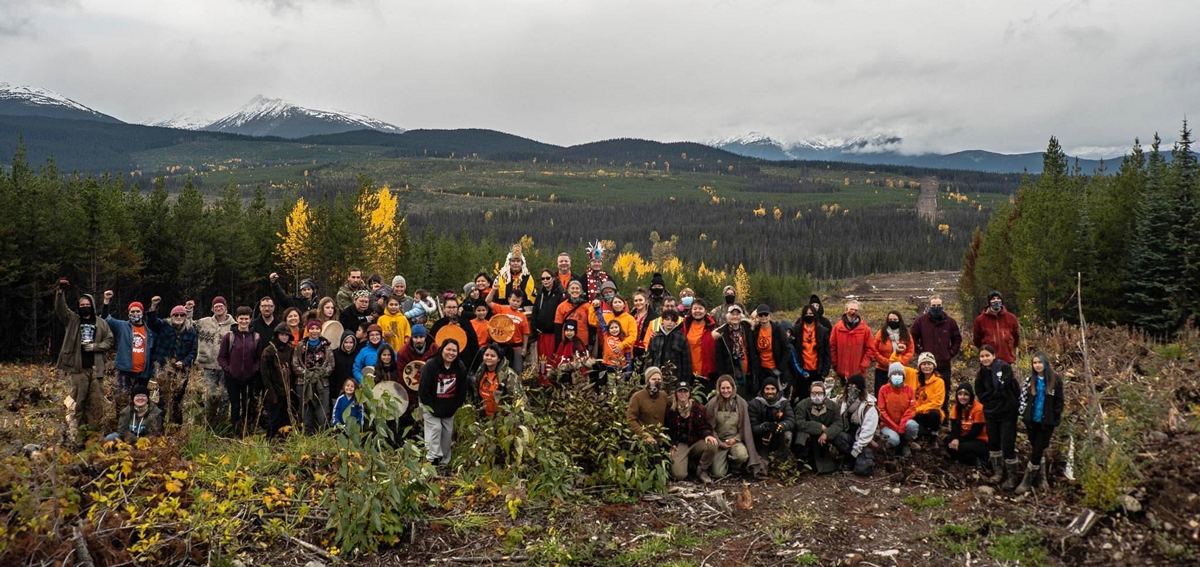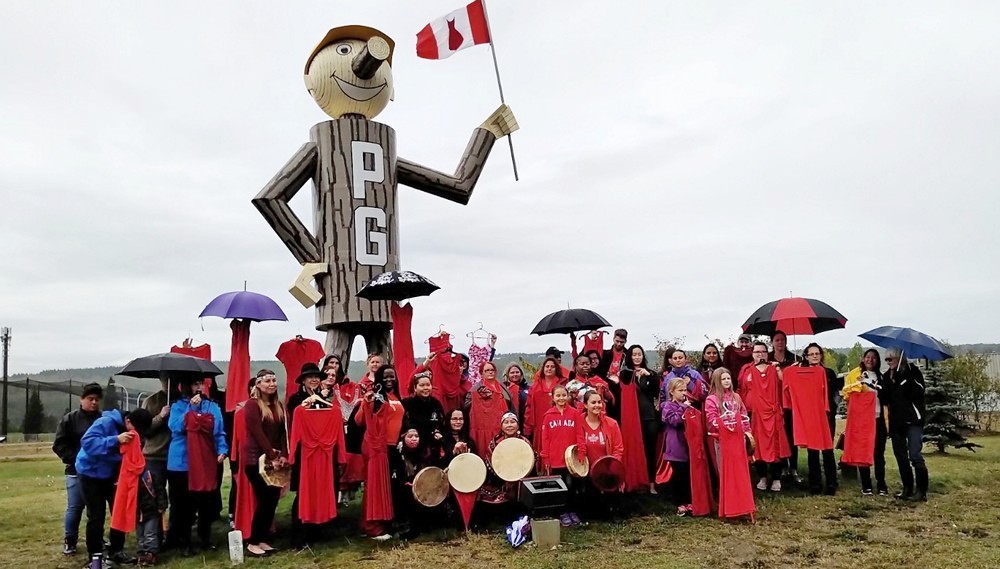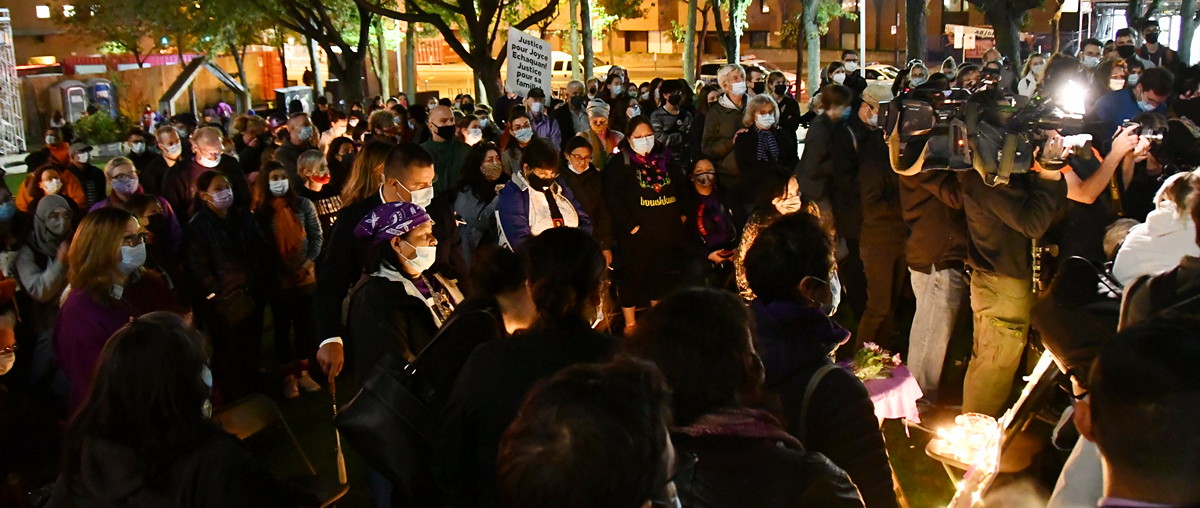
No. 37October 1, 2021
Orange Shirt Day
National Day Underscores Need to Uphold Hereditary Rights in Order to Achieve Truth and Reconciliation
Federal Court Upholds Canadian Human Rights Tribunal Decision
On September 29, Justice Paul Favel of the Federal Court upheld two orders made by the Canadian Human Rights Tribunal (CHRT) in 2019 in a case brought forward by the First Nations Child and Family Caring Society and the Assembly of First Nations in 2007. In their original complaint, the plaintiffs alleged that the federal government had racially discriminated against Indigenous children by the deliberate under-funding of child welfare services to children living in reserve communities, which was a violation of the Canadian Human Rights Act .
 The Federal Court ruling by Justice Favel was based on a week-long hearing held in June 2021 after the federal government requested a judicial review of two legal orders made by the CHRT in 2019. The first order involved compensation of up to $40,000 for each of the 163,000 Indigenous children who were removed from their homes from January 1, 2006 onward as a consequence of the deliberate under-funding of child welfare services, along with additional compensation for their families. The second order upheld Jordan’s Principle, which compels the federal government to ensure that essential health and social services to Indigenous children are inclusive and provided without delay. This includes providing services to children who do not have “status” under the Indian Act.
The Federal Court ruling by Justice Favel was based on a week-long hearing held in June 2021 after the federal government requested a judicial review of two legal orders made by the CHRT in 2019. The first order involved compensation of up to $40,000 for each of the 163,000 Indigenous children who were removed from their homes from January 1, 2006 onward as a consequence of the deliberate under-funding of child welfare services, along with additional compensation for their families. The second order upheld Jordan’s Principle, which compels the federal government to ensure that essential health and social services to Indigenous children are inclusive and provided without delay. This includes providing services to children who do not have “status” under the Indian Act.
From the time of the ruling by the CHRT, the Trudeau Liberal government has engaged in legal challenges using public funds aimed at overturning the decision on merit, and jurisdictional and legal grounds. Far from abiding by the order of the CHRT to pay compensation to the Indigenous children, millions of dollars from the public coffers were spent trying to overturn this decision. In the June 2021 hearing for example, Robert Frater, the government’s chief counsel argued that the CHRT had overstepped its jurisdiction. He called the CHRT decision “deeply problematic.” He also argued that there was no evidence to support this “massive compensation order.” In his submission to the hearing, Assembly of First Nations lawyer David Nahwegahbow called Canada’s arguments and conduct “callous ” and “heartless.” He added, “Since 2008, Canada has engaged in a campaign of obstruction, delay, deflection and non-compliance in the legal proceedings alongside ongoing and knowing discriminatory conduct in its operations and utterly inconsistent political messaging to the Canadian and the First Nations public.”
It is noteworthy that speaking at the English language Leaders’ Debate on September 9, Justin Trudeau denied his government’s sordid role in opposing the CHRT decision.
In his written decision, Justice Favel, a member of the Poundmaker Cree First Nation in Saskatchewan, reviewed the entire case from the beginning. Among other things he noted that the CHRT had not overstepped its authority and did not exceed its jurisdiction under the Canadian Human Rights Act. He noted as well that the federal government had not made its case at all based on the evidence and had plenty of opportunities to appeal previous orders but did not. He therefore denied the appeal.
The Marxist-Leninist Party of Canada congratulates Dr. Cindy Blackstock and all the Indigenous organizations and people who stood their ground to affirm the rights of Indigenous children, a stand that has the full support of the Canadian people. The MLPC calls on everyone to hold the Trudeau Liberals to account for their ongoing racist abuse of Indigenous children. The Liberals must not be permitted to continue to violate the rights of Indigenous children by more appeals and perfidy.
Carrier Sekani Family Services Releases Documentary
On the National Day of Truth and Reconciliation, Carrier Sekani Family Services presented a new documentary For Love that exposes the link between residential schools and the 29,000 Indigenous children and youth in Canada’s child welfare system.
“The horrors of residential schools are finally starting to be understood by non-Indigenous Canadians,” said producer Mary Teegee of Carrier Sekani Family Services. “I wanted this movie to create awareness about the generational trauma caused by residential schools. But it also celebrates the resilience of our people, and shows how communities across the country are rebuilding family connections and rich cultures.”
For Love is narrated by singer Shania Twain, and directed by artist and filmmaker Matt Smiley. It is produced by Smiley and Mary Teegee of Carrier Sekani Family Services, who produced the documentary Highway of Tears in 2015 about missing and murdered Indigenous women.
To watch For Love trailer click here.
Mi’kmaq Water Protectors Are Winning Some Battles

For close to a year and a half, Mi’kmaq water protectors have had an encampment, Truckhouse #2, alongside the Windsor Causeway of Highway 101 in Nova Scotia to monitor government compliance with tidal water flows vital to fish habitat in the macro tidal estuary of the Avon River. Through their resistance and organizing work they are winning some battles.
Most recently the federal Department of Fisheries and Oceans has issued an order that the Nova Scotia Department of Agriculture and the person or persons in charge of the Windsor Causeway gate system on the Avon River must “fully open both gates throughout each of the outgoing tides and fully open the gates through each incoming tide for a minimum of 10 minutes of salt water entry upstream of the gates.” This is one of the demands of the Mi’kmaq water protectors.
 Zacc Paul, an activist who has been at the encampment for 15 months, told Renewal Update that the tidal estuaries of the rivers in the Minas Basin are a rare and unique ecological resource. When Highway 101 was constructed in the 1970s, the Windsor Causeway essentially choked off the river and changed the entire ecosystem.
Zacc Paul, an activist who has been at the encampment for 15 months, told Renewal Update that the tidal estuaries of the rivers in the Minas Basin are a rare and unique ecological resource. When Highway 101 was constructed in the 1970s, the Windsor Causeway essentially choked off the river and changed the entire ecosystem.
The provincial government is currently twinning Highway 101, which the Mi’kmaq support, for the safety of highway travellers. The issue however is to ensure that the structures that span the Avon River will not impede tidal flow. The structures planned thus far for the twinning project are not designed to withstand tidal flow. The Truckhouse #2 encampment was set up both to monitor tidal flow with the existing structure and to hold the government to account for its environmental responsibility with the new structures being erected.
The Truckhouse concept dates back to the 1762 treaty between the Mi’kmaq and the Crown which recognizes the right of the Mi’kmaq to erect such structures on any river in order to conduct their affairs. In this instance it is conservation of the fish habitat and advocating for highway infrastructure that does not impede habitat vital to fish reproduction.
Zacc Paul said that is a big part of the work they are doing at the Truckhouse #2 encampment: outreach, teaching and learning. More than 81 per cent of local residents responding to the Windsor Causeway survey supported the position of the water protectors that the new structures must not impede tidal flow and fish habitat. The Maritime Fishermen’s Union for example, with their extensive understanding of the issue at the Avon River Causeway, have given their support, as has the Avon River Heritage Society.
Anyone interested in getting involved in helping the Avon water protectors can email 1752treatytruckhouse2@gmail.com or visit the Treaty Truckhouse #2 Society Facebook page.
Solemn Commemoration Calls for Justice and Reparations for Joyce Echaquan

On Tuesday evening, September 28, a memorial vigil was held at Place Émilie-Gamelin in Montreal to honour the memory of Joyce Echaquan. Earlier that day, at 10:30 am, family and friends gathered in front of the Lanaudière Integrated Health and Social Services Centre (CISSS) in Joliette.
On September 28, 2020, Joyce Echaquan, a young Atikamekw woman from Manawan, the mother of seven children, the youngest of whom was barely seven months old at the time, died under inhumane circumstances at the Centre intégré de santé et de services sociaux de Joliette.
 The gatherings called for justice for Joyce and for missing and murdered Indigenous women and girls; an end to indignities and injustices committed against the Indigenous nations; government implementation of the 142 recommendations of Quebec’s Viens Commission and of those contained in the Final Report of the National Inquiry into Missing and Murdered Indigenous Women and Girls, and for government accountability and immediacy in turning them into reality.
The gatherings called for justice for Joyce and for missing and murdered Indigenous women and girls; an end to indignities and injustices committed against the Indigenous nations; government implementation of the 142 recommendations of Quebec’s Viens Commission and of those contained in the Final Report of the National Inquiry into Missing and Murdered Indigenous Women and Girls, and for government accountability and immediacy in turning them into reality.
The evening memorial vigil gathered together over 250 people from all walks of life, to bring support and strength to her husband, her children and the Atikamekw community who continue to mourn her loss.
The vigil began with the sound of the drum, an instrument of Indigenous spirituality, and a song. Many people held candles and a space was set up with candles and photos in tribute to Joyce. A solemn atmosphere of remembrance marked the evening, with a minute of silence dedicated to her memory. Two lanterns were released into the sky by members of her family.
The vigil was organized by the United for Joyce Coalition and the Caring for Social Justice Collective, who explained Joyce’s Principle, elaborated and launched by the Atikamekw Council of Manawan to obtain justice for Joyce and her peers. [1] They are calling on the government and various institutions to recognize and implement Joyce’s Principle.
An obstetrics nurse spoke of a growing movement in opposition to the Coalition Avenir Québec government, and for the adoption of Joyce’s Principle and its application in the health and education network. “For those of you who work in the health care system, I invite you to respond to the call for justice that it is our duty to address and to stand with the Indigenous communities we serve,” she said.
The many speeches highlighted the determination of the organizers and of all those present and their dedication to Joyce and to the struggle of Indigenous peoples for justice and in defence of the rights of all. Joyce’s cruel death at the hands of a racist health care system, destroyed by governments’ anti-social offensive, is a reminder of the need for change and to stop its destruction, as Joyce and so many others have lost their lives as a result of inadequate care.
Ghislain Picard, Chief of the Assembly of First Nations Quebec-Labrador, emphasized the need to rely on the people’s own forces for change and spoke of the necessity to step up the pace of our mobilization to bring about change.
Achieving justice for Joyce, for the missing and murdered Indigenous women and girls, for the children buried in unmarked graves and for an end to the indignities and injustices committed against Indigenous peoples was on everyone’s mind. Claims, recommendations and consultations all demand that governments be held accountable and that immediate action be taken to turn promises into reality, to put an end to governments’ colonial relationship, including that of the Canadian state, with Indigenous peoples and for the recognition of their rights.
All Out to Support the Echaquan Family and the Atikamekw Community!
All Out to Put an End to Racism and the Indignities Committed Against the Indigenous Peoples!
Note
1. Statement of Joyce’s Principle:
Joyce’s principle aims to guarantee to all Indigenous people the right of equitable access, without any discrimination, to all social and health services, as well as the right to enjoy the best possible physical, mental, emotional and spiritual health.
Joyce’s Principle requires the recognition and respect of Indigenous people’s traditional and living knowledge in all aspects of health.
(Photos: A. Querry)
Violent Arrest of a Land Defender at Gidimt’en Checkpoint

Gidimt’en Checkpoint marks National Truth and Reconciliation Day, September 30, 2021.
On the eve of National Truth and Reconciliation Day, the crimes Canada commits against the Indigenous peoples were fully evident on Wet’suwet’en territory. The Gidimt’en Checkpoint has posted a video which gives proof of how the police and Coastal GasLink security are brutally arresting land defenders. The accompanying report says:
“On September 27, a land defender blocking a fracked gas pipeline was brutally arrested. This is the second arrest at the drill pad site access road, where Coastal GasLink (CGL) plans to drill under Wedzin Kwa (Morice River), the sacred headwaters on Wet’suwet’en yintah.”
The report continues:
“The arrest was brutal. The RCMP officers used ‘pain compliance’ for an hour on the person locked under the bus in a hard lock [a device referred to as a sleeping dragon], insisting the person just let go, which very clearly they were not able to do.
“The RCMP then had CGL contractors, instead of an extraction team, come in to extract the person. The injunction very clearly states that RCMP are the only ones to enforce the injunction. This is in violation of that.”
The land defenders point out that the violent actions on September 27 on Gidimt’en territory come on the heels of the denial of Teal Cedar’s application for an extension of an injunction against protestors at the Fairy Creek old-growth logging blockade on Vancouver Island, due to the RCMP’s violent tactics against protestors.
The report concludes:
“This is about our yintah (land). It always has been. They have been trying to steal our lands and resources since contact and they will bulldoze and torture their way through to get it, because all they care about is money.
“We will never give up. Join us.”
Coming Event
Red Dress “Stand In” at Highway of Tears
in Prince George

Sunday, October 3 — 1:00 pm
Gather at Mr. PG, at the corner of Highways 97 & 16 (Highway of Tears)
Bring your red dress to hold in honour of those who have been taken. Together we will be their voices and ensure they are not forgotten. Hope to see you there!
This is a COVID-19 safe event so remember to bring a mask, hand sanitizer and social distance as appropriate.
For information e-mail: pgreddress@outlook.com.
(To access articles individually click on the black headline.)
Send your articles, photographs, reports, views and comments to editormlpc@cpcml.ca


